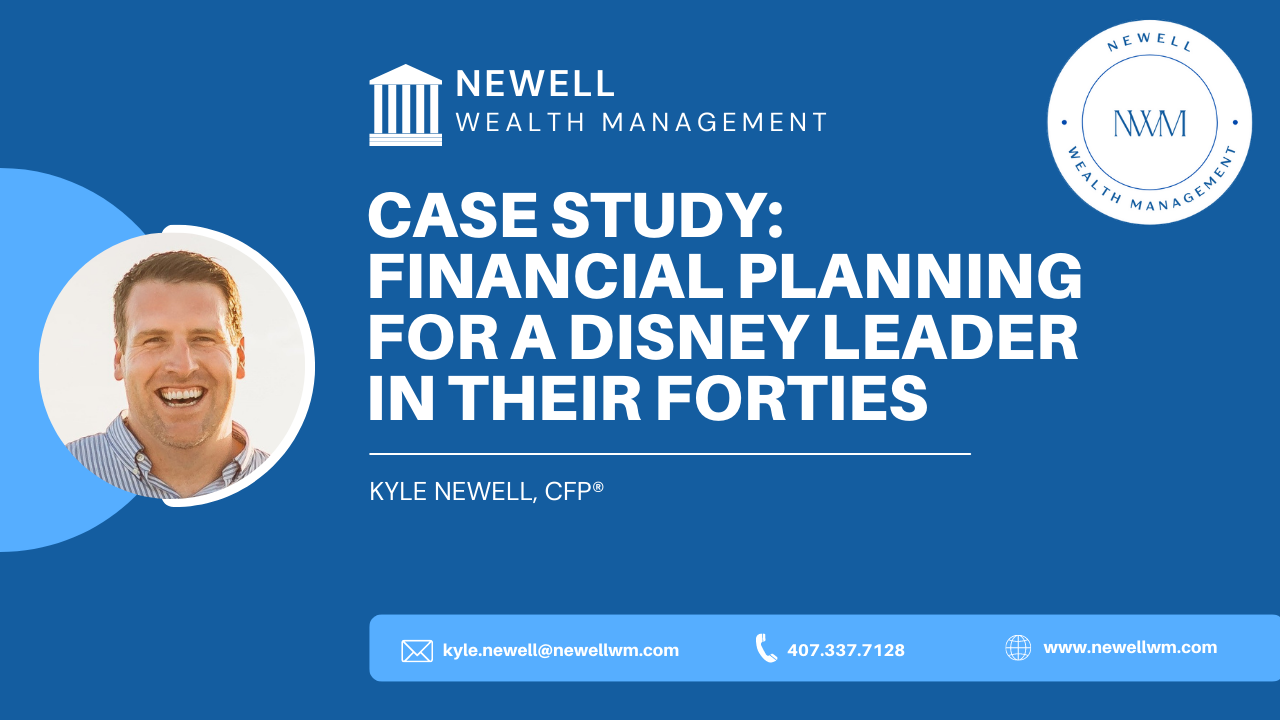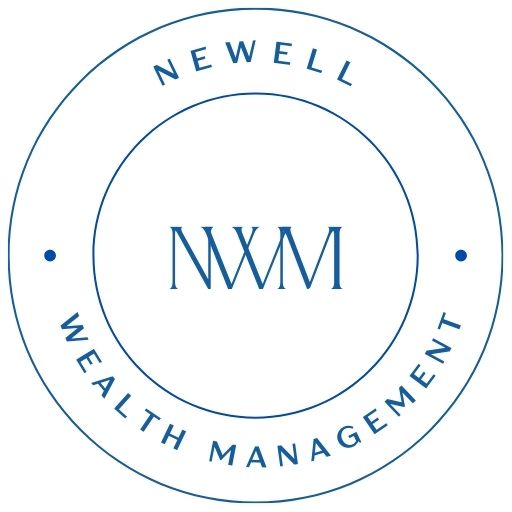Financial Planning Case Study: Disney Leader in Their 40s

Suppose you’re in your 40s and you are a leader at Disney. In that case, there are a lot of financial situations and considerations to evaluate. Thinking through your current situation and your goals and objectives will help you make some decisions around the various challenges and considerations you may have.
On top of just being a regular person planning for retirement and ensuring your family is taken care of, working at Disney means you’re busy and dealing with a lot of stress. Although it’s a great place to work, sometimes outside factors loom in the background like
- Potential layoffs
- Stressful work situations
- Political considerations within the office environment
You’re trying to work your way up the ladder, and you’re spent at the end of the day. You are certainly smart enough to figure the financial stuff out. At the same time, trying to determine what you should, or shouldn’t be doing, takes time and energy. You may feel like you’re in a good financial position but aren’t sure.
Your financial future is too important to leave to chance. Here are some things I talk through with clients in their 40s who are either Disney leaders or salaried cast members.
What Are You Trying to Accomplish?
The answer to this question determines everything else. It all points back to what you’re trying to accomplish.
More than likely, your answer will be multifaceted.
If you’re in your 40s, you may have young children or kids who are a little older and getting ready for school. Your goals may look like these.
- Paying for college
- Taking family vacations
- Putting in a pool
- Buying a vacation home
- Starting a side hustle to get away from the grind and not have to worry about retirement
- Being able to retire and live the life you want
There are lots of different considerations. Each of them pulls us in different directions. It’s essential to get crystal clear on what you want to accomplish in the next five, ten, or 20 years. If you’re married or have a partner, talk through this together. Ask yourselves individually and as a couple.
- What are your (our) values?
- What are your (our) priorities?
- How do those priorities align with the actions I (we) need to take today or in the future?
Think about what you want to accomplish and what the ideal outcome looks like for your finances and life in general.

Where Are You Currently?
Once you understand what you’re trying to accomplish, you can back up and look at where you are currently.
- How much money do you have saved?
- Where is the money located?
Is it in savings, a 401k or Roth IRA plan, mutual funds, or company stock? Each one will have different risks and tax ramifications. Your 40s are a prudent time to reevaluate your investment strategy and tax situation. Maybe what would have been good ten years ago is not as good now.
Compensation and Planning
Understanding the ramifications from a tax and risk perspective is essential. Also, consider how your compensation works.
For example, you’re a Disney leader in your 40s with a base salary. You may also have a bonus potential that’s upwards of 15-25% of your income. Your salary could also be bonus eligible depending on the metrics that you hit.
And on top of that, you may also have the Disney LTI (Long-Term Incentive) Plan. The plan grants company stock twice a year over three years, based on the 2023 plan terms. However, Disney does make changes to the LTI plan regularly.
I can’t stress enough how important it is to understand what your goals are and what your current situation is. Your money is going to help you accomplish the objective.
Most people have retirement high on the priority list. Retirement is one of the only things you can’t borrow money for. Is saving for retirement ranked equally as high on the list for you?
If you’re a Disney leader, you may be making enough income and have enough bonus income to be able to max out the 401k. In your 40s, it’s over $20,000 per year. Over 50 is almost $30,000 a year that you can put into your 401k. This amount does not include the company match.
The company may also be providing a Disney pension, Disney 401k, or Disney Retirement Savings Plan. You need to pull all these things together and make some projections toward retirement.
Paying for College
If you want to pay for college, are you saving for college currently? Part of the equation for college may be looking to see if dialing back your retirement contribution once your child is in school is an option. It may be that you have not saved enough for retirement, so you need to ramp that up, and paying for college isn’t an option.
In the second scenario, your children must find another way to pay for college, whether a loan, scholarship or by working. As a cast member, you already know Disney Aspire is a wonderful program where Disney will pay for college. Your child may also decide to work for Disney to pay for college.
Emergency Funds
If retirement is taken care of and you have a plan to pay for college, you should also make sure you have enough for an emergency fund. On average, an emergency fund is typically three months of living expenses.
As a Disney leader, if something happens to your position, the ability to find another job with similar pay may take longer. Consider having 6, 9, or even 12 months of living expenses in a savings account for an emergency cash flow.
Thankfully, savings accounts are earning higher interest rates than in the past, but that’s not always going to be the case. Your emergency fund is an insurance policy. It’s not a vehicle to earn money.
Excess Money
Let’s assume all of these scenarios are handled, and you have excess money. What do you do with it?
- Use it for leisure activities
- Investing in more family time through taking time off or vacations
- Buy a vacation home or put in a pool
However, if your financial house is not in order, you need to take some steps to get there. Maybe you need to
- Pay down debt
- Build an emergency fund
- Catch up or add to retirement savings
Your current situation will impact the best way to move forward financially as a Disney leader in your 40s.
Company Benefits
After looking at all the primary factors, you should also evaluate what the benefits offered by the company are. Disney’s company benefits package is healthy. Aside from compensation, you will have other benefits as a cast member.
Health Insurance
Which health insurance option will you choose? Typically it’s based on your situation.
All things being equal, I’m a fan of the high deductible plan to take advantage of the health savings account. The health savings account is the only vehicle where you can save on taxes in three ways. Trying to take advantage of that is great. Still, you also want to be conscious of your overall health insurance costs and your health situation.
You want to avoid stepping over dollars to pick up pennies, so to speak, where a health savings account is concerned. Suppose you’re relatively healthy and don’t go to the doctor often. A health savings account/high-deductible plan combination is a strong consideration in that case.
Legal Plan
Disney also offers cast members a legal plan. Proper financial and estate planning means making sure you have your estate planning documents in place. It’s not fun to think about “what if” scenarios, but it is necessary.
Estate planning documents include things like
- Will and Living Will
- Power of attorney
- Trust documents
These documents allow you, or your loved ones, to make decisions for you if you are unable or pass away. I have covered this in more detail in an article found here.
Life Insurance
Estate planning and life insurance go hand in hand. Having the right amount of insurance helps provide peace of mind for you and your family. In your 40s, life insurance costs start to increase substantially. It might make more sense to have a life insurance policy outside the company policy for cost reasons.
Disability Insurance
Disney’s disability insurance is “own occupation for two years and any occupation after that.” At your income level, if you become disabled, you might not be able to continue to make the amount of money you’re currently making.
It may be worth evaluating whether a disability policy outside the company is worth it. They do come with extra costs and factor into where you want to spend the resources you currently have to protect yourself and the life you want to live.
A Lot to Think About
As you can see, there are a lot of considerations if you are a Disney executive, leader, or salaried cast member in your 40s. Planning for retirement, caring for your family, and working responsibilities all pull at you. It can be exhausting.
While this is not an all-inclusive list, these are some of the top things I advise clients to consider. As an experienced financial planner specializing in helping Dinsey cast members, I’m happy to help you review or create your financial plan.
Important Information
Newell Wealth Management, LLC (“NWM”) is a registered investment advisor offering advisory services in the State of FL and in other jurisdictions where exempted. Registration does not imply a certain level of skill or training. The presence of this website on the Internet shall not be directly or indirectly interpreted as a solicitation of investment advisory services to persons of another jurisdiction unless otherwise permitted by statute. Follow-up or individualized responses to consumers in a particular state by NWM in the rendering of personalized investment advice for compensation shall not be made without our first complying with jurisdiction requirements or pursuant an applicable state exemption.
All written content on this site is for information purposes only and is not intended to provide specific advice or recommendations for any individual. Opinions expressed herein are solely those of NWM, unless otherwise specifically cited. Kyle Newell and NWM are neither an attorney nor an accountant, and no portion of this website content should be interpreted as legal, accounting or tax advice. Material presented is believed to be from reliable sources and no representations are made by our firm as to other parties’ informational accuracy or completeness. There is no assurance that the views or strategies discussed are suitable for all investors or will yield positive outcomes. Investment involves risks including possible loss of principal and unless otherwise stated, are not guaranteed. Any economic forecasts set forth may not develop as predicted and are subject to change. All information or ideas provided should be discussed in detail with an advisor, accountant or legal counsel prior to implementation.
